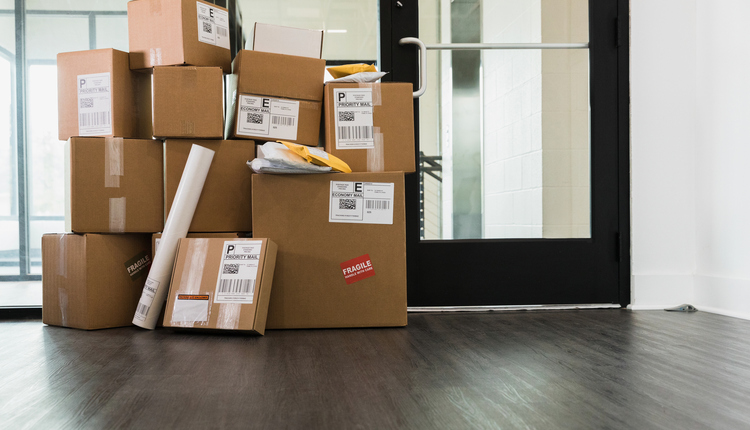Like many companies, Aspen Direct discovered that shipping small packages First Class was draining its mail center budget. The Mount Prospect, IL-based company that specializes in promotional and premium items for large corporate clients needed to get its products delivered quickly and cost effectively.
�Our goal is to get every item where it�s going as fast as possible, as cheap as possible,� comments Jim Zaio, manager of distribution, inventory and control for Aspen Direct. �First Class mail will get it there quickly, but it�s going to cost you an arm and a leg. Bulk mail is cheaper, but it�s just too slow for time-sensitive materials.�
To minimize costs, yet maintain acceptable delivery times, Zaio has been taking advantage of the special discounted rates the U.S. Postal Service offers to drop shippers. Also known as consolidators, drop shippers sort and comingle mail and parcels and transport them to the Postal Service distribution center nearest their destinations. The closer the drop shipper gets the mailpiece or package to its final destination, the greater the discount � up to 70% less than First Class in many cases.
Zaio says the company�s savings have been quite substantial. �We save as much as $10,000 a month in postage,� Zaio remarks.
Aspen Direct works with Drop Ship Express, one of more than a dozen consolidators in the US that offers shippers direct service to Postal Service facilities such as Bulk Mail Centers (BMCs), Sectional Center Facilities (SCFs) and even Direct Destination Units (DDUs). The deeper the consolidator can drop an item into the Postal Service system, the greater the savings for the shipper. Prior to the January 1999 Rate Case, the furthest shippers could drop into the Postal Service system was a Bulk Mail Center. However, with delivery available to the DDU level, shippers are now afforded much greater savings.
Cost-Saving Opportunities
Many shippers find they cannot qualify for cost-saving programs because of their low volumes; however, this isn�t the case with drop shipping. Since consolidators are able to create a truckload by combining the packages of a number of shippers, low-volume shippers can now join in on the savings. While larger volumes will remain to offer the greatest discounts, lower-volume shippers are able to qualify for more discounts than previously available. In addition, drop shipping will most likely become more attractive, if not necessary, as other carriers increase residential surcharges.
In addition to the cost savings, drop shipping affords many other benefits. Most likely, shippers will find that consolidators are more flexible than other carriers and offer superb customer service and state-of-the-art technology, such as tracking via their Web sites.
While nearly all of the consolidators offer barcode tracking and tracing up to the point of the Postal Service drop, shippers can opt for Delivery Confirmation to continue their tracks on the package. Delivery Confirmation provides the delivery date, ZIP code and whether the item was delivered, attempted, forwarded or returned.
Expansion Continues
The drop shipping industry remains relatively young. CTC Distribution Direct, which may be one of the first to enter the business, has been drop shipping for less than two decades, however, its growth is evident. Of the dozen or so �major� consolidators in the industry, more than half have entered the industry within the last five years, and there�s little doubt more companies will enter the drop shipping arena in the future, providing additional options to shippers.
In the coming years, shippers will notice the most growth in metropolitan areas where consolidators are adding dozens of new sortation and pick-up centers. Recently, Parcel/Direct and Drop Ship Express opened a number of new pick-up and sortation centers with PFI planning to also do so later in the year. While many facilities are found in more densely populated areas, shippers in outlying areas won�t necessarily find themselves out of luck. The trend seems to be toward national availability of services.
Drop Shippers Differ in Offerings
At first glance, it may seem difficult to separate the drop shippers, after all, they provide the same service. While they do drop packages into the Postal Service system for a discount, how they do it differs greatly and that�s what sets each apart.
Take for example, PFI, a Vernon, CA-based drop shipper. It specializes in deliveries to Southern California DDUs, covering more than 1,000 ZIP codes. This would be a great benefit for shippers who have a concentration of deliveries to this region of the country. On the other hand, CTC Distribution Direct has 18 sortation centers across the country, allowing it to hit more than 6,000 DDUs nationwide weekly, many of them daily. And then there�s Drop Ship Express, who specializes in the handling of parcels weighing less than one pound, bound printed matter, irregulars and flats.
In addition, many consolidators offer additional services, such as warehousing and fulfillment, returns services, tracking on their Web sites, as well as tracing. Parcel Corporation of America offers ocean container management, providing customers with service to quickly clear containers out of ports and transport them to its facilities on the West Coast until they can be forwarded to their final destinations, wherever they may be.
In the coming years, consolidators will offer additional services to better meet the needs of shippers, according to Judith Marks, president and CEO of Paxis, a consolidator headquartered in Jacksonville, FL. �Facilities will incorporate beyond the current distribution offerings to integrate fulfillment and returns management, offering a more complete supply chain solution for shippers.�
Technology Avails
In the past year, barcode tracking of individual parcels and the options for identifying parcels has increased. More consolidators now offer additional options on parcel tracking, most notably the inclusion of the UCC/EAN-128 carton identification number.
For companies with a retail component in their customer bases, this means that a single parcel tracking numbering system can be used regardless of the consignee. For those shipping to industrial customers, the continued popularity of the DUNS number as a shipper ID conforms to many industry barcode-labeling standards.
Online parcel tracking is also becoming more widespread, due in part to the availability of barcode tracking. To facilitate online tracking by the consignee, the tracking number has to be known. Consolidator-assigned numbers have to be transmitted after the fact to consignees, whereas shipper-assigned numbers, whether UCC/EAN, USPS or DUNS-based, can be assigned at the time of the online purchase.
In the coming years, consolidators will continue to offer shippers the most up-to-date and state-of-the-art technology. �There will be a continuous infusion of technology to enhance information management, processing efficiencies, decision support for both the consolidator and the shipper and total supply chain visibility,� notes Marks.
Partnering with the Best Provider
To find the best fit for your operation, you should analyze your needs and then find a consolidator who can fulfill them. Don�t look to an expediter if your customers aren�t looking for overnight or two-day service, or if you�re shipping high-priced jewelry, look for a consolidator who can offer you Delivery Confirmation and perhaps Web-based tracking.
Marks adds, �Shippers should evaluate the broad opportunities of a consolidator and the value-add service opportunities offered to expand within the supply chain beyond consolidation and distribution.�
Meeting Market Demands
Perhaps the largest area of future growth for the consolidation industry will be seen in the e-commerce industry. �E-commerce is exploding,� according to Harry Quadracci, founder of Parcel/Direct. �Internet sales will quickly jump from billions to trillions.� Quadracci adds, �We expect that a significant portion of our future growth will be attributable to e-commerce growth.�
And while some shipping managers may find that their companies� infrastructures will not support their projected growth, other shippers will have to deal with more bottom-line concerns.
Many e-commerce retailers are now finding that they must offer free shipping to stay competitive. While shipping fees charged to customers may once have paid postage costs or even provided added revenue, many shipping managers are now left cutting corners in other areas to pay for their postage budgets. Managers will find it a necessity to cut shipping costs, yet at the same time maintain acceptable delivery standards and times. Drop shipping may be the answer for many of these shippers. They won�t be able to justify paying a $1.00 residential surcharge, plus a $1.50 rural residential surcharge, in addition to the shipping cost and perhaps, a Saturday delivery charge.
Drop shipping can be an effective solution to logistics headaches and rising freight costs. Shippers may be surprised to find out how consolidators are willing to work with them to create individual shipping solutions to meet their needs. And with the number of consolidators increasing at a steady rate, shippers will be happy to see how competition will work to their benefit.
For more information on these companies, you can visit their respective Web sites: CTC Distribution Direct, www.ctcdist.com; Drop Ship Express,www.dropshipexpress.com; Parcel Corporation of America, www.parcelcorp.com; Parcel/Direct, parceldirect.com; Paxis, www.paxis4u.com; and PFI,www.paqfast.com.





